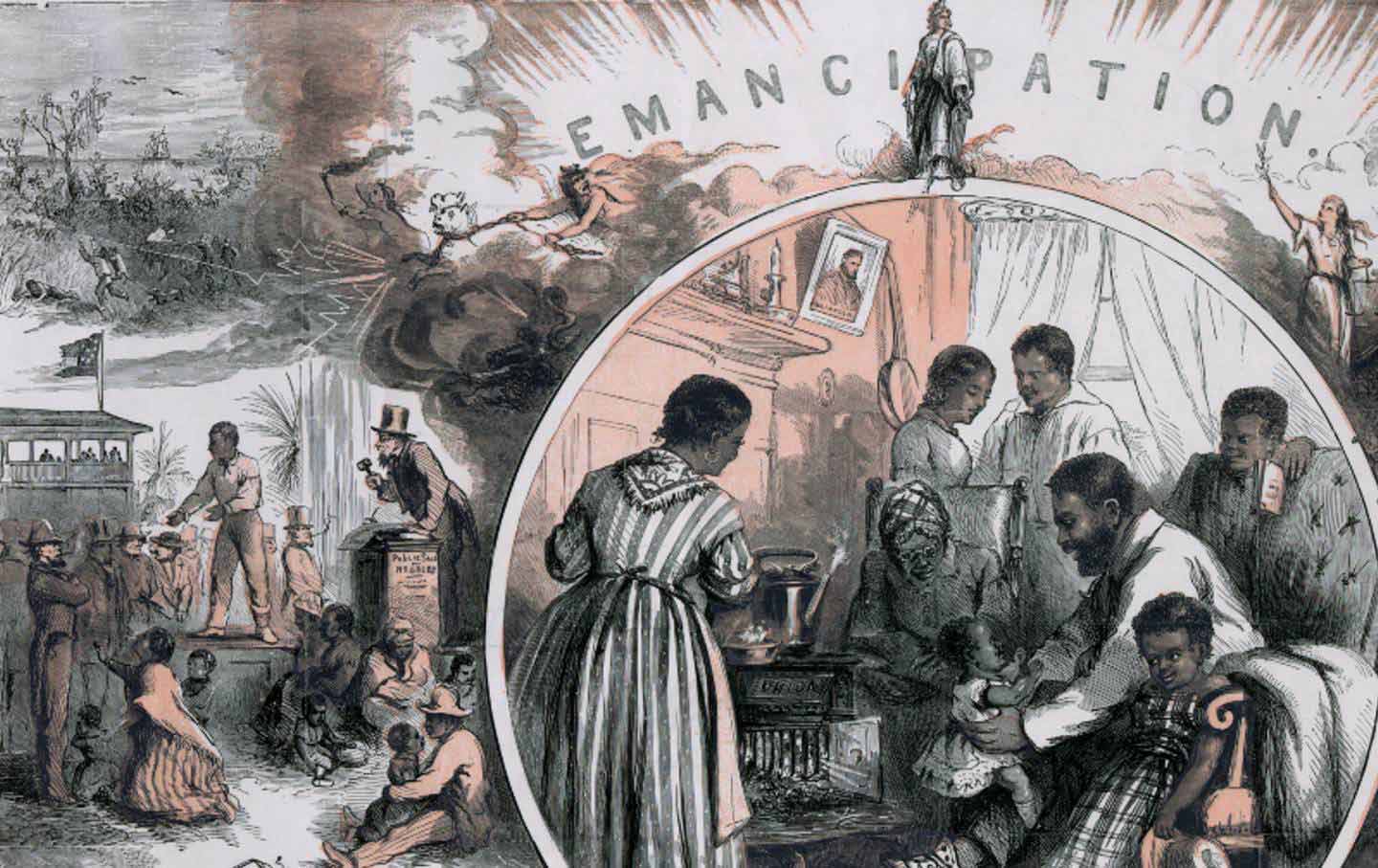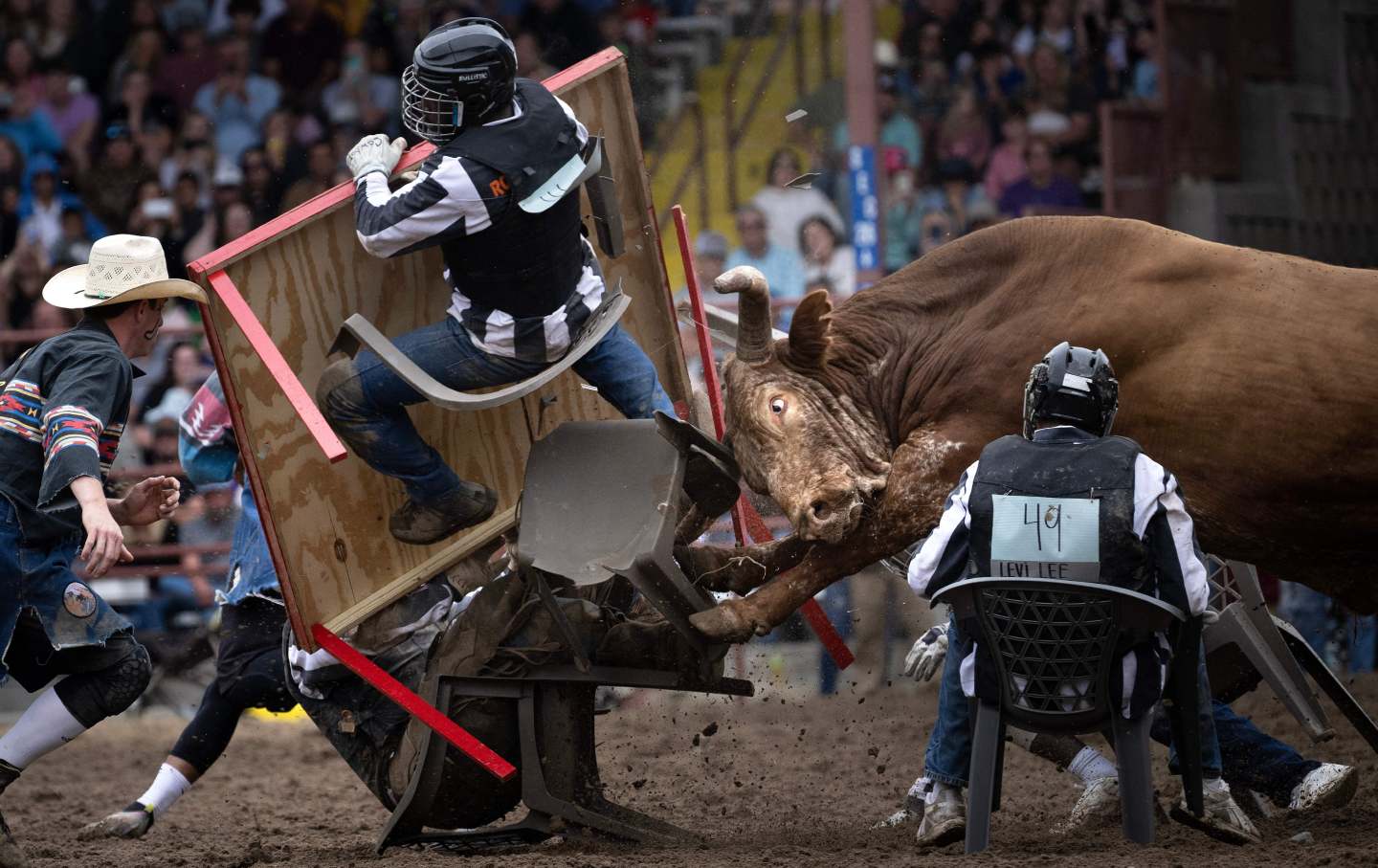In “We’re Not Going Back!” Dems Find an Antidote to the Politics of Nostalgia
Underneath the cliché that “we’re all in this together” lie harder truths that will need to be faced if Harris and Walz want to rally the nation for real change.

The failed campaign to save Nicola Sacco and Bartolomeo Vanzetti—the Italian immigrants and anarchists who were executed in 1927 for a bank robbery and murder they didn’t commit—prompted John Dos Passos to lament, in his novel The Big Money, that “our nation has been beaten by strangers who have bought the laws and fenced off the meadows and cut down the woods for pulp and turned our pleasant cities into slums and sweated the wealth out of our people and when they want to they hire the executioner to throw the switch.” In his impotence and rage, Dos Passos came to recognize a deep political truth: We are not all in this together.
Not in the America of the radical-hunting Palmer Raids, or in the “return to normalcy” promised by Warren G. Harding, or in the nation that celebrated the Immigration Act of 1924, which sought to restore a white, Anglo-Saxon Protestant vision of the country as it was supposedly being menaced by Catholic and Jewish immigrants from Southern and Eastern Europe. Nostalgia has always been a powerful force in our politics; Dos Passos himself heard its siren call. But he also tried to break free of its spell with his cry of “All right we are two nations.”
The politics of nostalgia are anything but simple. The Republican convention in Milwaukee was a veritable festival of nostalgia for a time when America was on top of the world—and white men were on top in America. Yet in selecting JD Vance as his running mate, appealing to the simpler virtues whose loss provides Vance’s book Hillbilly Elegy with its wistful tone, Donald Trump also lifted up a man whose own mixed-race family rebukes the blood-and-soil nationalism he advocates on the stump.
Nor are Democrats immune to the lure of an idealized past. I suspect that for many of us, the greatest generation is not the one that defeated fascism in World War II but the men and women who took on racism at home and the Vietnam War and imperialism abroad. But like the fight against fascism, their work remains unfinished. Until we cease to be the oligarchy Dos Passos described—where the economy’s winners make the rules and the losers, enraged and desperate, fight over the crumbs—America will never be truly great.
Yet as I watched Kamala Harris and Tim Walz introduce their ticket to the country in Philadelphia in early August, I found myself wondering what made this moment suddenly seem so hopeful. Compared with the two old men it looked like we were going to have to choose between, both of them seemed youthful and full of energy. And in the repeatedly shouted declaration “We’re not going back!,” their campaign was able to powerfully distill—and dispel—the reactionary threat posed by Trump and Project 2025.
But I also found myself recalling a line from a poem by Langston Hughes:
Hold fast to dreams
For when dreams go
Life is a barren field
Frozen with snow.
Eventually, I recognized that some of what I (and likely others in that massive crowd) was feeling was nostalgia. Specifically, nostalgia for 2008 and 2012, when the campaign of Barack Obama seemed to offer the hope that, at long last, America would redeem its promises. Hope is a powerful drug. But so is hope abandoned, hope denied, dreams endlessly deferred—which, as Hughes also reminds us, are liable to explode. Can we ever become one nation? There’s only one way to find out.
To help you manage the suspense, this month we’ve assembled a bumper crop of literary gems for our Fall Books issue: Edna Bonhomme on the Southern laureate Natasha Trethewey, Hannah Gold on the interior dramas of Garth Greenwell, Lovia Gyarkye on Danzy Senna’s comedy of manners, Benjamin Kunkel on economic growth, Nicolás Medina Mora on Rachel Kushner’s political thriller, Samuel Moyn on the surprising politics of equality, and Bijan Stephen on Questlove’s personal history of hip-hop.
Plus, Amy Littlefield on abortion on the ballot in Florida; Elie Mystal on the scariest Republicans of all (they’re not running for president); Katie Rose Quandt on probation without end; Eleni Schirmer on negotiating with Jane McAlevey; and Barry Yourgrau on early anti-Zionism.
Hang on! It’s going to be a bumpy couple of months.

D.D. Guttenplan
Editor
We cannot back down
We now confront a second Trump presidency.
There’s not a moment to lose. We must harness our fears, our grief, and yes, our anger, to resist the dangerous policies Donald Trump will unleash on our country. We rededicate ourselves to our role as journalists and writers of principle and conscience.
Today, we also steel ourselves for the fight ahead. It will demand a fearless spirit, an informed mind, wise analysis, and humane resistance. We face the enactment of Project 2025, a far-right supreme court, political authoritarianism, increasing inequality and record homelessness, a looming climate crisis, and conflicts abroad. The Nation will expose and propose, nurture investigative reporting, and stand together as a community to keep hope and possibility alive. The Nation’s work will continue—as it has in good and not-so-good times—to develop alternative ideas and visions, to deepen our mission of truth-telling and deep reporting, and to further solidarity in a nation divided.
Armed with a remarkable 160 years of bold, independent journalism, our mandate today remains the same as when abolitionists first founded The Nation—to uphold the principles of democracy and freedom, serve as a beacon through the darkest days of resistance, and to envision and struggle for a brighter future.
The day is dark, the forces arrayed are tenacious, but as the late Nation editorial board member Toni Morrison wrote “No! This is precisely the time when artists go to work. There is no time for despair, no place for self-pity, no need for silence, no room for fear. We speak, we write, we do language. That is how civilizations heal.”
I urge you to stand with The Nation and donate today.
Onwards,
Katrina vanden Heuvel
Editorial Director and Publisher, The Nation








